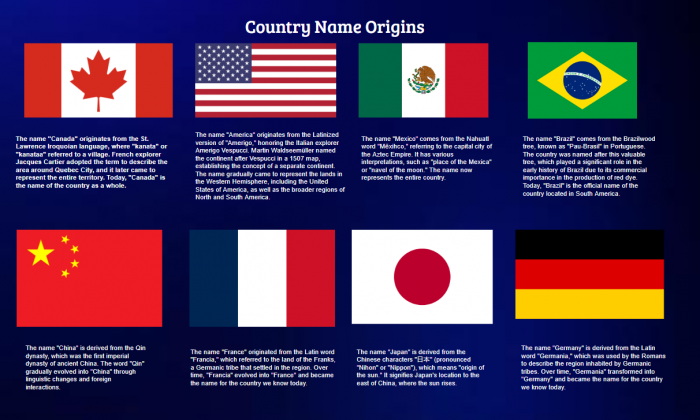
Have you ever wondered why countries are named the way they are? From exotic and poetic names to those rooted in history and culture, there is often a fascinating story behind each country’s name. In this article, we’ll take a journey around the world to explore the origins and meanings behind the names of various countries. Join us as we delve into the rich tapestry of linguistic heritage and unravel the hidden narratives behind these captivating country names.
America
America is a Latin name. It means “land of the Amerigo,” which refers to a famous explorer, Amerigo Vespucci. The first time that America was used in its modern form was by this man who sailed with Christopher Columbus on his second voyage to the New World in 1499.
Italy
Italy is named after the Italian peninsula. The name “Italy” comes from the Latin word “Italia”, which was derived from Greek ?????? (Italia). The Greeks were the first to use this word, referring to an area of southern Italy that included Sicily and Sardinia. The Romans later adopted this name as well and used it to refer to all of their territory south of Rome itself (including modern day Lazio). It was only later that they expanded their empire beyond those borders and began calling themselves Romans instead of Italics or Italians!
Brazil
Brazil was named after the brazilwood tree, which is native to South America. The Portuguese were the first Europeans to arrive in Brazil. They named their colony “Portuguese West India Company” and established it as a waystation along a route between Portugal and India (which they had recently colonized). The Portuguese also brought African slaves with them to work on sugar plantations; these slaves made up 85% of Brazil’s population by 1800.
China
The name “China” comes from the Qin Dynasty, which was the first imperial dynasty to rule all of China. It’s thought that this name may have been derived from Qin Shi Huangdi (pronounced chin shi wuang dee), who was a king during this time period. The country’s official name is “People’s Republic of China,” but many people refer to it as simply “China.”
France
France, the country that gave us the Statue of Liberty and the croissant, is named after a Germanic tribe called the Franks. The Franks were a tribe that lived in modern-day France in the 5th and 6th centuries AD. They were conquered by Rome and became part of their empire; however, they did not adopt Latin as their language but rather kept using their own dialects (which would later become French). The Franks converted to Christianity under Clovis I (481-511) and helped spread Christianity throughout Europe in later years.
I hope you enjoyed reading about the origin of these country names! I know that learning about this kind of thing can be fascinating, but also a bit overwhelming sometimes. The best way to get started is by picking one country at a time and learning all about its history and culture. You should also try visiting other countries if possible–this way, you’ll get an even better sense of how different cultures shape each other across the globe!
